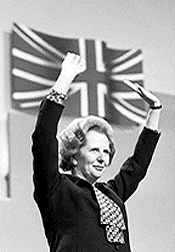"What Britain needs is an iron lady." -Margaret Thatcher

Thatcher and Ronald Reagan were contemporary leaders of two powerful democratic countries during the ideological battle known as the Cold War. Both Thatcher and Reagan were known for their conservative ideals, and the two were very close as a result. Thatcher was the longest serving British PM in the 20th century and also the first and only female PM. She served the United Kingdom from 1979 to 1990.
During her terms, she met weekly with Queen Elizabeth II to discuss matters of business. The press tended to speculate that Thatcher and the Queen did not get along, though Thatcher later reveals that she and the Queen had absolutely no trouble getting along and agreed on most issues.

Thatcher demonstrated extreme frugality with her funds in office, though government spending increased 12.9% during her terms. In facing economic issues, Thatcher reduced spending on social services and decreased income taxes. She also increased indirect taxes and increased interest rates to lower inflation. Her terms saw a steep fall and then a steep rise in economic well-being. The recession of the early 1980s saw 3 million unemployed Britons and a low job approval rating for Thatcher of 23%. Yet in 1982, the UK began to recover, and in 1987, the economy stabilized and became strong while inflation fell. The Conservatives held a lead in opinion polls.
She supported many other conservative ideas, such as reducing the power of unions and increasing privatization of business. A source of conflict came under the Irish Republican Army's attempted assassination of Thatcher and successful assassination of 5 other government officials. Following this, Thatcher controversially signed the Anglo-Irish agreement, granting the Republic of Ireland an advisory role in the governance of Northern Ireland.

In the matter of foreign affairs, Thatcher was staunchly anti-communist. She also opposed the integration of Europeans into a singular identity. She opposed apartheid but also didn't approve of the sanctions imposed on South Africa to end it, and she became the first British PM to visit China, where she discussed the issue of Hong Kong sovereignty.
In later years, her party became more popular than her. Her party believed they would not win the election with her as lead, and voted for Michael Heseltine over her. She viewed it as a betrayal. However, John Major, not Heseltine, succeeded her as Prime Minister.
Sources: Biography.com, Brainy Quote.com, Margaret Thatcher.org, Wikipedia
No comments:
Post a Comment